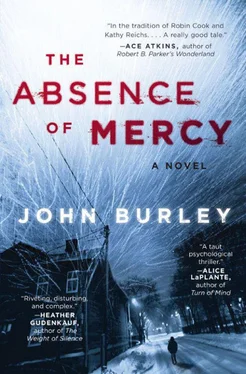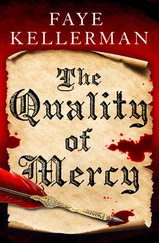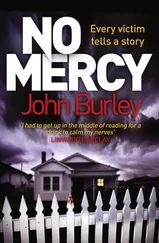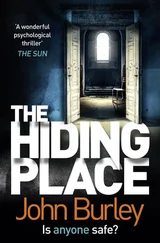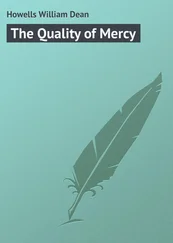“Nothing exciting,” she said. “Schoolwork and physical therapy, mostly. They’ve got me jogging on a treadmill now. Three days a week for thirty minutes.” She grimaced. “I hate running.”
“You shouldn’t. You’re good at it.”
“How would you know?” she said, a reflexive note of challenge in her voice. “You’ve never seen me run.”
There was a slight pause. “No, but you’re good at everything,” he told her. “I’ll bet you’re fast as hell when you want to be.”
She had a brief image of herself hurtling through the woods, her breath coming in ragged, terrified sobs—and then it was gone.
“Not fast enough,” she said, standing up and walking to the window. She pressed her fingers up against the glass. The front yard was still blanketed in heavy drifts. Tree branches spread their naked fingers toward the sky.
“Listen, I’ve gotta go,” he said. “Hang in there. I’ll be home in a few days.”
Don’t go yet, she felt like saying. We can talk for a little while longer, can’t we ? She pressed her lips together and remained silent.
“I’ll call you tomorrow,” he promised. “Okay?”
“Okay,” she replied, her voice faltering a bit on the last syllable.
She listened to the receiver until the connection was lost, until the mechanical voice on the other end told her that if she would like to make a call she could hang up and try again. She thumbed the off button and placed the phone on the desktop beside her, but remained standing at the window for a long time, looking out at the bleak afternoon. Except for a few parked cars, the street outside was vacant, devoid of the children who so frequently played there. These days everyone was being careful. Her eyes wandered across the stillness of front yards and driveways, overturned sleds lying lifeless and abandoned in the snow. From her vantage point behind the protective pane of glass, the scene suddenly struck her as offensive, almost obscene—as if she’d unexpectedly come across a dirty magazine sitting on the dresser in her parents’ bedroom. She had the urge to turn away, to pretend she hadn’t noticed.
“It’ll be okay,” she told herself, but she wondered now if it ever really would be—for any of them.
These days she wondered about that a lot.
It was Monday afternoon. The cold snap had finally decided to relinquish its hold on the region, and the snow and ice that had collected on the frozen ground almost a month ago had now, at long last, initiated its inevitable metamorphosis toward oblivion. Trillions of rivulets of muddied water set out on their sluggish, unhurried journeys into sewer drains, streams, ponds, reservoirs, and even into the porous flesh of the earth itself. The white landscape that had maintained a constant presence during the past few weeks now gave way to patches of brownish, puddled muck. Tree limbs, unencumbered of their heavy loads of frozen precipitation, stretched out their wooden spines as if straightening themselves at the end of a long day of stooped, hunchbacked labor, and the spines of many of the town’s residents bent to shoveling sidewalks newly freed from the thick layer of ice that had rendered the concrete walkways nearly impossible to clear only a day before.
So it was that Sam Garston found himself sitting in his office watching the snowmelt dribble past his window in large pregnant drops from the station’s roof down onto the sidewalk below. He had gotten a call from the lab less than an hour ago. Several of the prints they’d collected from the Stevenson kid’s locker that morning had matched those found on two of the three victims. (The body of the last victim, having been buried in the snow for several weeks, hadn’t yielded any salvageable prints at all.) “Was there any question about the match—any doubt in the analyst’s mind?” Sam had asked. “Not much,” the man on the other end of the phone had replied. The error rate of the software program they used for such purposes was about one in 1.6 million. That didn’t leave a whole lot of room for wishful thinking.
That had been enough to request a search warrant of the Stevenson residence, which Judge Natalie Grossman, presiding over the Jefferson County Courthouse that day, had granted them. Detectives Schroeder and Hunt had gone to pick up the document and would be contacting Sam in his office as soon as they had it in hand. He’d already notified Larry Culver from the FBI of their findings and pending search of the home. The bureau would send its own forensic team to assist them with evidence collection. The Stevenson boy would be arrested on-site and taken in for questioning. The rest of the family would also need to be questioned, however painful that might be for Sam personally. It was important to ensure that the boy had acted alone.
The call from the crime lab regarding the fingerprint match had invoked in Sam an unpleasant surge of nausea that he’d been unable to shake over the last fifty minutes, despite a generous swig from the bottle of Maalox he kept in the lower right-hand drawer of his desk. That, mixed with the onset of just a touch of mild chest pressure, made him wonder (with no small degree of concern) whether he might be in the process of having himself one of those all-American heart attacks he’d heard so much about over the years. Why not? he asked himself. He’d put in his time at a few greasy spoons in his day. He was certainly due for a few rounds in the ring with the ol’ Massive Coronary. If so, perhaps he’d be staring up at the inside of a closed casket before the week was through. “Now there’s a nice thought,” he muttered, as he watched a piece of melting ice abandon its grip on the gutter above him and tumble unceremoniously like the corpse of a dead bird to the concrete below. He took another swig from the bottle of antacid in his right hand, wincing at the thick, nasty artificial sweetness of it. Heart attack . Just the idea caused him to break out in a light sweat.
This is one of the many unpleasantries of the job, he thought: finding out that someone you knew, someone whose parents you’d had dinner with on more than one occasion and whose father was not only a colleague but also a friend, had wandered onto the wrong side of the law. (Hell, in this case “wandering onto the wrong side of the law ” was a monumental understatement now, wasn’t it?) And yet, when Sam thought about the fury that had been unleashed on those young souls… When he thought about the heartbreaking agony sustained by those children’s parents… Indeed, that was the worst of it, he reminded himself. Not this .
As for this part—the arrest and its aftermath—Sam was merely fulfilling his responsibility, wasn’t he? It was a responsibility that’d begun when he’d entered the training academy as a young man. Back then, it had only been an idea, a concept—words he had uttered with the rest of his class during a graduation ceremony almost forty years ago. Still, he’d never suspected the measure of sacrifice the job would ultimately demand of him, or the personal casualties that would be sustained along the way. Now, decades later and near the end of his career, he could look back and finally take stock of the full weight of those casualties. His restless nights and the half-empty bottle of Maalox he now clutched in his hand were only the beginning. The uncomfortable pressure that had taken up residence in his chest this afternoon was also a part of it. But most of all, there were certain tragedies he had witnessed—their images stuck in his mind like desert burrs, caked with the dirt of time but sharp and tenacious nonetheless—that served to remind him that the world, or at least the human race, was indeed broken in some fundamental and perhaps irreparable way. That was the true measure of payment the job had exacted upon him over the years.
Читать дальше
Конец ознакомительного отрывка
Купить книгу
